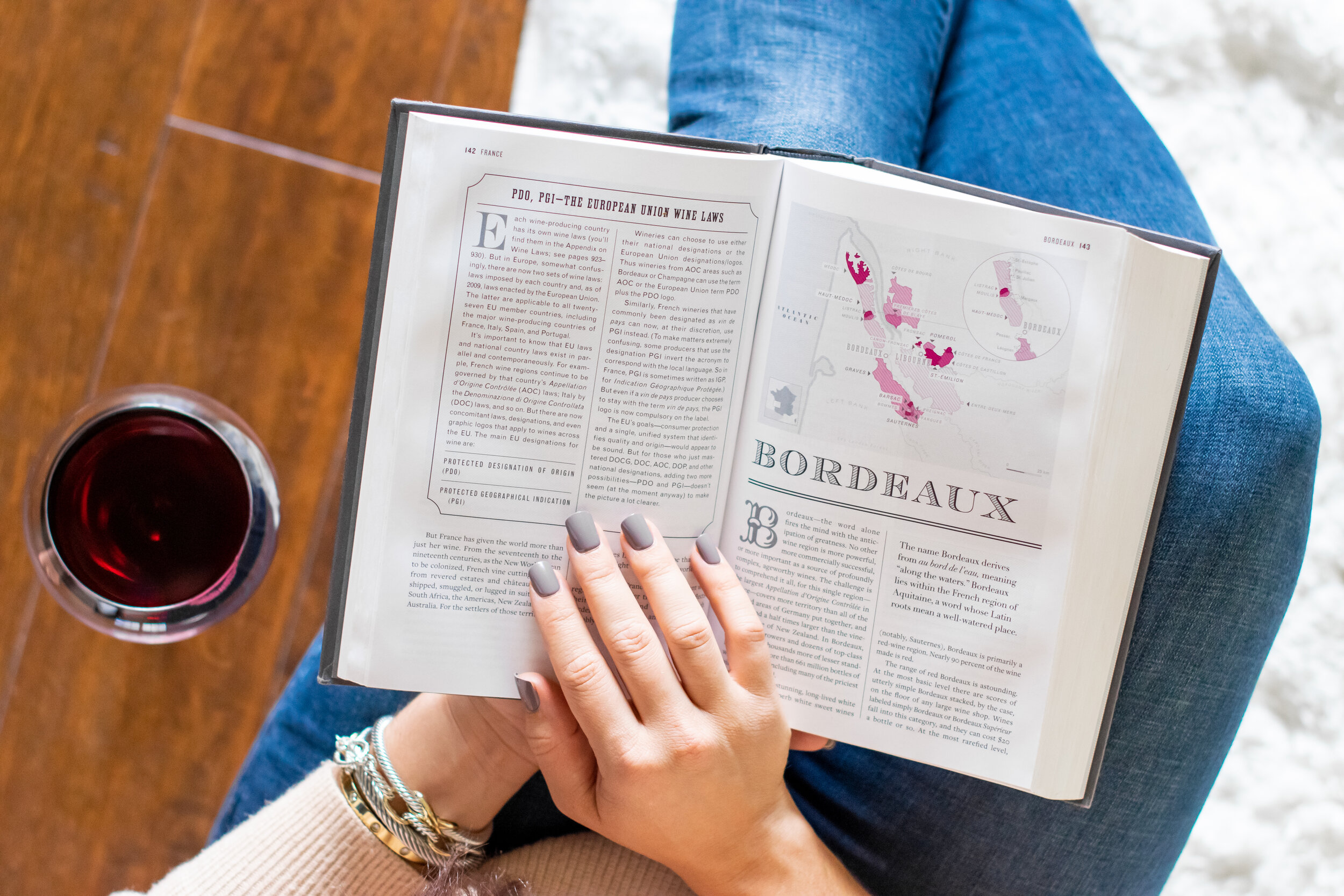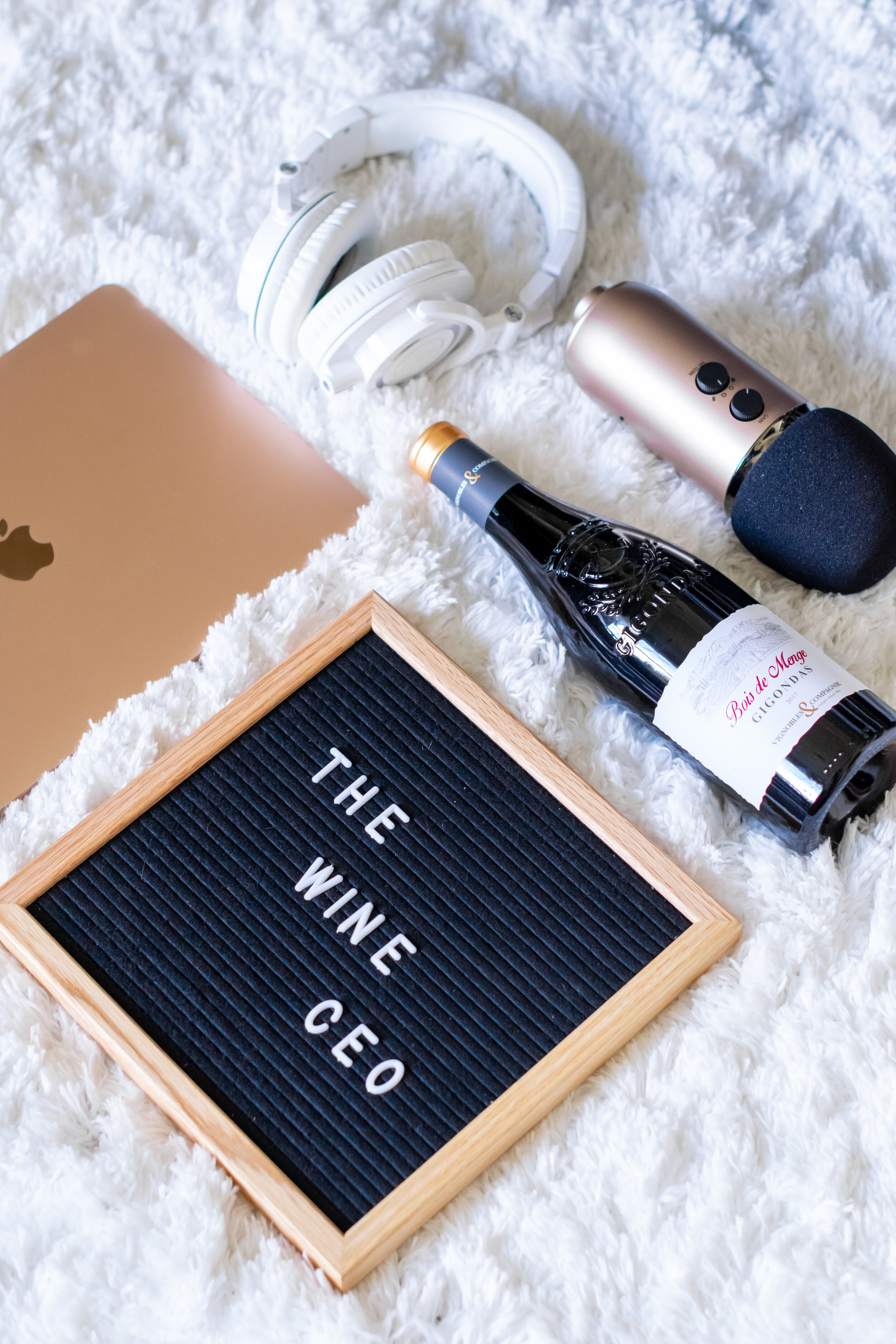Top Tips for Studying Wine
Studying wine can be intimidating. With over 1,300 wine varietals and dozens of wine producing countries out there, it can be difficult to know where to start! Friends ask me all the time, “How can I learn more about wine?” and in episode #20 of The Wine CEO Podcast, I dive into this question. If you want to listen to the entire episode, click the link below. Otherwise, keep reading for all of my tips on where to begin in your wine studying journey. And this article is focused on wine enthusiasts who are learning about wine for fun at their own pace. If you are looking to study wine for your industry certification or to become a sommelier, please feel free to email me at sarah@thewineceo.com and I would be happy to give you some tips and tricks from 10 years of food and beverage industry experience.
Don’t get overwhelmed and give up! There are a lot of wine regions and grape varietals, but I promise it is possible in time to feel very confident in your wine knowledge!
So my first recommendation when you are starting to study wine is….don’t get overwhelmed and give up! Yes, there’s a ton of wine information out there. And if you approach it the wrong way, it can feel impossible to tackle. But I promise you that it is possible….and more importantly, it is FUN! This isn’t rocket science or quantum physics! It’s easy and fun, so if you’re going to pick a hobby to explore and learn more about, this is a great one. You won’t learn it all overnight, but it’s an enjoyable process and a fun topic to pursue for years and years.
Okay let’s dive into the reason you’re still reading…..the specific tips to help you be successful in studying wine.
Drink Wine Regularly
I know this may sound silly, but the more you drink, the more you will learn and understand. Wine is experiential and the more you taste new flavors, the more your muscle memory will hold onto this knowledge. Think about when you were a kid and you were learning your foods for the first time. Your mom gave you a carrot and it looked funky and different and you didn’t want to try it, but when you finally did - you liked it! And then you had a reference for what a carrot was. Later you learned about apples, bananas, etc. and overtime you built up a large encyclopedia of different foods you tried. Wine is the same way. You have to be willing to try a lot of different kinds to find out what you like and what you don’t. Technically you can learn a lot about wine just by reading about it, but there is something different when you taste it.
Something to keep in mind is that adding wine into your weekly or even daily routine can become expensive! So if you are planning on studying wine, be sure to budget accordingly as it will add up over time….trust me ;)
2. Read Wine books and resources
Technically this should be done in parallel with #1! You can learn a lot from drinking wine, but you will need to learn from various books and references to understand where the wines are coming from and why they taste the way they do. Some people like to physically read about a particular wine or region while drinking the wine, but I like to enjoy the wine. So when studying, I will try to read about the wine in advance so that I know what to look out for. If you are about to try a wine that you know nothing about, try jotting some notes down into your phone as you drink and maybe taking a picture of the label. This will let you refer back to something later when you read up on the wine.
Some awesome wine books to check out are:
Wine Folly the Magnum Edition by Madeline Puckett*
The Wine Bible by Karen MacNeil
Windows on the World Wine Course by Kevin Zraly*
The Oxford Companion to Wine by Janis Robinson
*These two are great for beginners. I love all of them but the other 2 books are VERY nuanced and have a lot of detail for someone who is just starting to study wine!
3. Begin studying by region
This is the #1 mistake most people make is trying to study wine by varietal. So they decide to learn all about Chardonnay and they quickly become overwhelmed trying to understand how it is grown in 27 different regions from countries they don’t know yet! So when you are starting to dive in, begin by choosing a region you want to tackle.
For example, let’s say you pick New Zealand. You would start by reading about New Zealand to understand the terroir of the region (which is just the fancy French word for all of the factors that make a geographic area unique. So weather, location, climate, soil types, and more). While studying the New Zealand wine regions, you’ll learn about the specific varietals that are grown in those regions and what they are known for. Then you can go to your local wine store, find those wines, and try them.
Stay on that region for a few weeks to give yourself time to try a few wines from various regions within that country and see how styles can differ slightly from producer to producer. Revisit your readings on New Zealand throughout those days or weeks to remind yourself why these wines taste the way they do.
I also like to look at pictures of the regions I’m tasting from. Wine can help you experience new cultures, so research the country and look at photos of the people and landscapes. You can even learn about some of the local cuisine and try some recipes with your wines to get the full effect of this region.
4. Ask for help at the wine store
I know that every introvert reading this just groaned out loud. But hear me out…..
The majority of folks who work in wine stores have at least a basic level knowledge of wine, some even have advanced and master levels. This is amazing because they can recommend certain things to you that you otherwise wouldn’t have known. Especially if you have a locally owned, small wine market, the owner is likely fairly knowledgeable since they work closely with distributors to bring in a wide assortment of options for their customers.
If we follow the same example from above, you may be looking for a few wines to try from New Zealand. If you are simply perusing the aisle, you may pick whichever ones have a pretty label or fit the price point you’re looking for. But, if you ask for help, the store employee may be able to steer you towards the exact bottle you’re looking for - one that fits the profile you’re learning about, fits your price point, and is aligned with the classic flavors from that region. Some wine makers are trying unique things, and that’s fine when you are just having fun drinking a random wine on a Friday night. But when you are studying, you want to make sure you are trying wines that are classic to the flavors of that particular region.
Now if this sounds intimidating, there is a little work around for all of my introverts! See if the wine store has a catalog online so you can do some research before you go shopping. Go to each winemaker’s website and look for a “tech sheet”. Winemakers create these awesome fact sheets to give retailers and distributors a little more information about the wine. They usually use them for product knowledge so that servers and store employees can be more educated on their wines. But they are totally free and accessible tools that you can find as well! Below is a great example of a Tech Sheet from Nobilo Wines in New Zealand.
5. Visit Restaurants and Bars with a wine focus
I know this may be difficult for some depending on where you live and the availability of restaurants near you. I also understand that it’s difficult right now with a lot of restaurants closed or at limited capacity due to Covid. But if you can, look for places that have unique wine lists or are actually called ‘wine bars’. These restaurants and bars will usually have experienced staff and sommeliers who can teach you about wine. Don’t be shy! Let them know that you’re studying wine and would love to know more about the particular wines they offer. I’ve been in this industry for years and you don’t always assume someone wants to learn about what they’re drinking! Sometimes people just want you to pour their glass and let them have a good time. But if you open that conversation up, the server or bartender will know that you are interested in learning anything they can teach you. They may even be really nice and offer you a tasting of a few different wines on the house so you can compare a few wines. If this happens, remember to give the server a nice tip as they don’t have to go out of their way to help. And if they don’t give you that extra TLC you’re hoping for - try a glass of whatever they recommended and then find a new restaurant or bar to check out! There are a lot of restaurants and wine bars where the culture is encouraged to teach others about wine. People who love wine and are passionate about it want to share it with you! So hopefully you’ll find a place like that and then you’ll have a regular spot where you can keep trying new and exciting wines as you study. And who knows, they may even invite you to some private tasting dinners or tell you about other cool wine spots in town. You can only learn so much from a book, so getting out into your local wine community will help immensely.
6. Travel to wine regions
This one is optional, but a fun one if your time and budget allow! There’s nothing like drinking a wine in the vineyard where it was made. It’s a magical experience when you get to see the climate and soil where the grapes came from and taste the final expression the winemaker created. Even if you can’t travel far, do some research to see if there are any good wineries close to your home. And if you need ideas or recommendations, you can always send me an email or message on social media and I would be happy to give you some!
7. Keep following The Wine CEO
I know this is a shameless plug, but if you keep listening to my weekly podcast show, follow me on Social Media, and subscribe to my newsletters, I promise you will learn more about wine! We are just scratching the surface of all of the awesome wine topics I have in store for you all. AND I present it in a fun and easily digestible way! So even if you just listen to my show for 15 minutes a week, by the end of each year, you will be shocked at how much you’ve retained! Click the link below to start listening the The Wine CEO Podcast now and don’t forget to share this post with a friend who you want to study wine along with you!


